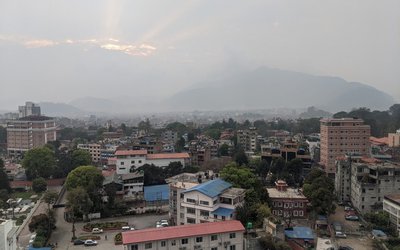Even a sceptic has to confess: there is something magical about loktantra. Just chant this simple mantra and Open Sesame! All doors to financial, political and intellectual impunity will magically throw themselves open.
How else does one explain a caretaker prime minister (i.e. no longer a prime minister but only a seat-warmer) berating the permanent secretaries of government for not obeying him? And that too at a function in official premises to launch a book written by the revenue secretary on general administration. (Why is a permanent secretary writing a book on administration – said to be his 22nd! – on taxpayer time and money rather than doing good administration in the first place and then writing his book only upon retirement?) In normal countries, a politician in his position would have simply taken administrative action he is empowered and obliged to, instead of ludicrously throwing a public tantrum. Or he would have resigned on moral grounds. But then he HAS already resigned so the moral high ground is ostensibly there. That illusion, however, rests on the quicksand of politically questionable ethics: what gives him and his ministers the right to take grave and far-reaching decisions when they as caretakers are not supposed to? Is such unaccountable behaviour the result of loktantra that allows him and most of his cabinet to consist of people who were rejected by the Nepali people during the last elections?
His foreign minister’s private secretary was involved in passport scams some months back. She herself cancelled the MRP process and illegally awarded the passport contract to India’s government press, resulting in not only time loss with re-tendering but also the Mughlanis being compensated $48,000 for preparatory losses. Why should the price of such malfeasance be dumped on the Nepali taxpayer and not be recovered from her? Because she is the daughter of loktantra! That impunity now extends to her Bangladeshi son-in-law on the principle that no law is more powerful than a son-in-law, that too a loktantrik one! The feckless prime minister and the 23 parties in power, as well as the Maoist opposition, have no guts, or moral sensibilities, to demand that she step aside for public decency’s sake.
In the same meeting, the prime minister confessed he felt ashamed of the ongoing load-shedding. It would have been more helpful if he had instead felt a sense of duty and done something about it. He lamented that the plan to import electricity from India by building transmission lines was going nowhere. Someone should have explained to him that north India has a current deficit of some 15000 MW and does not have any surplus to export, even at the very high price they are demanding, and that building 400kV transmission lines to Bihar or UP is really to export electricity, and not to serve Nepal’s needs. And his energy minister has been giving away licences to plum hydro sites for export, violating article 156 of the constitution, as if he were a Rana potentate distributing fiefdoms. For the leader of a party that calls itself Marxist, the incapacity to see the neo-colonial developmental politics involved is truly breath-taking. But to give him credit, he did take some action recently. His energy minister and secretary have not been on speaking terms, even as the country reels under crippling power cuts. The prime minister rightly refused to transfer the mild-mannered secretary for months, but recently did so only because the minister started turning to YCL-style violence (almost, but for the grace of Pashupatinath, in the presence of a Scandinavian envoy!) and the personal safety of the civil servant had to be ensured. Loktantra does not allow the sacking of loktantrik ministers for misdemeanour: it is the civil servants that are to be blamed and punished.
Such impunity for the new political masters lies at the heart of loktantrik politics all because of the magic mantra of loktantra. Such is its lure that its shamans can vampire-like, draw fresh blood from far and wide for their own sustenance, without the victims being aware of it. A case in point is the visit of Nobel laureate Elinor Ostrom a month back. Physics Nobel laureates have visited Nepal in the past at the behest of RONAST, but Ostrom must be the first economic laureate to arrive here. It is not that Ostrom’s award is universally acclaimed. Writing in the New York Times, Prof. Steven Levitt said that the economics profession has hated her getting the prize, and many eminent economists had to google her name to find what she had done. The reason is that she is a political scientist, and even among those there are many who argue that the link between her data and the rational choice theory that she and Vincent Ostrom adhere to is rather tenuous. The truth is, after Amartya Sen (and BRAC’s Mohammed Yunus), Nobel Prize in Economics is slowly moving towards becoming a Nobel Social Science Prize, and the Nobel Committee must be praised for it.
Despite such international academic jousting, it must be said, her being awarded the Nobel prize is a great honour for Nepal too, because a significant part of her work is based on work done in Nepal on community-managed irrigation as well as other natural resource systems, and her students and colleagues too have made seminal contributions to the field. The irony is that she was provided full state welcome by a government which has done the most to damage community-based natural resource management in Nepal. The forest minister has introduced legislation on forestry which has sent forest user groups on a warpath, and the energy minister has recently disbanded NEA’s community electricity department forcing the national association of community electricity users to begin planning for nation-wide agitations. What Elinor Ostrom stands for, this current dispensation does not; hence its honouring her is but a cynical attempt to bask in reflected glory. Ostrom probably does not even realize this, even as she must be regaling department colleagues back in Indiana with stories of her Nepal visit.
One has to look beyond the democratic rhetoric spewed ad nauseum by our loktantrik party leaders, which in reality they themselves do not believe. The deeper political reasons for their actual anti-community actions by have to do with their pursuit of centralizing politics in the financial interests of their clans and cliques. An incident in Amelichhap village of Dhading on 27th July 2008 provides useful insights. It was the 2nd anniversary of the founding of the National Association of Community Electricity Users Nepal, and they were marking the day by creating a special fund to help the poorest of the households with their house-wiring. The CDO of Dhading and this author had to be the default chief guests as the water resources minister from the all-powerful Girija-UML-Maoist cabinet failed to arrive. What was mind-boggling were the podium speeches by the local political leaders of both Maoist and Kangressi persuasions: both ends of the political spectrum were opposed to community electricity, both felt electrification was the government’s duty which it should not shirk by heaving it off onto the shoulders of the community.
Why would these two very different political cultures have such a similar negative policy towards community empowerment? To the Kangressi leader, who was a shop-owner down below on the Prithvi Highway, community electricity undermined his “vote for me, I’ll get you electricity” patronage dispensing politics. For the Maoist, a village-level electricity cooperative or association would mean the emergence of a strong organizing principle in the village outside of his party’s control. Community empowerment would mean their effective disempowerment, hence their need to prolong the current state of unaccountable impunity. This is why there is no seriousness in constitution framing or curtailing bad public behaviour by their cliques and clans.

Dipak Gyawali
Gyawali is Pragya (Academician) of the Nepal Academy of Science and Technology (NAST) and former minister of water resources.
- Maldevelopment And Technology: Ethos Harbingering Coming Apocalypse
- Apr 03, 2024
- World Social Forum: Rethinking and Redefining Development Itself
- Feb 21, 2024
- Remembering An Inspiring Karma Yogi
- Jan 09, 2024
- New World Disorder And The Case For Ideology
- Dec 13, 2023
- Loktantra’s Moral Turpitude
- Nov 06, 2023
















